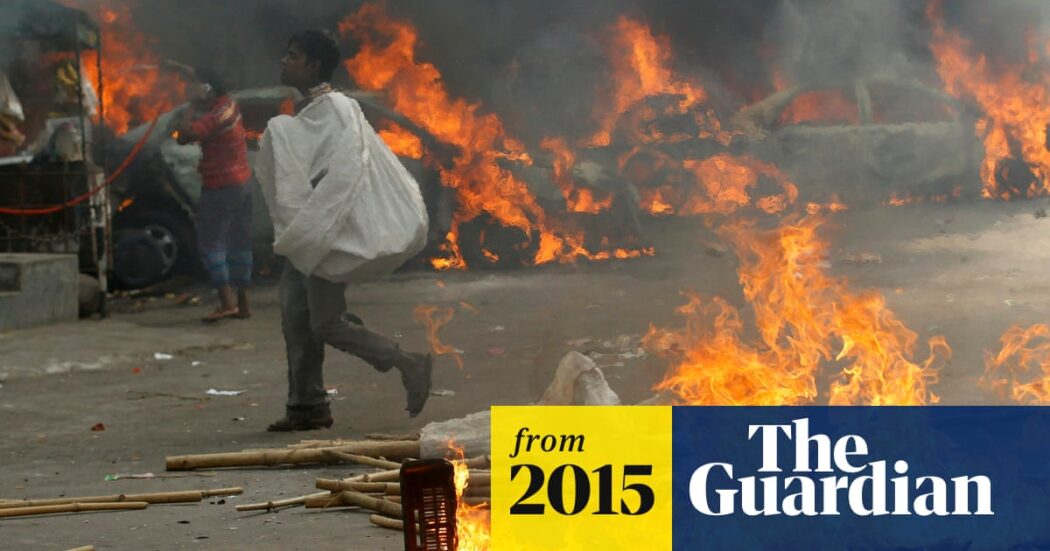
Try Adsterra Earnings, it’s 100% Authentic to make money more and more.

The prime minister of Bangladesh has warned David Cameron that he needs to do more to combat radicalism amid concerns that British jihadis are fuelling a rise in extremism in the world’s third most populous Muslim nation.
Security and intelligence experts in Dhaka says British jihadis are stoking an Islamist revival in Bangladesh, schooling a new generation of young religious radicals sympathetic to Isis.
Recruiters and extremist funding from Britain’s Bengali diaspora communities are encouraging locals to join the cause of international jihad, and the number of Bangladeshis involved in salafi groups is rising, the experts say.
“The British government should take more steps on the ground,” the Bangladeshi prime minister Sheikh Hasina Wazed told the Guardian. “Jamaat [-e-Islami – Bangladesh’s leading Islamist party] has a strong influence in east London. That’s true. They are collecting money, they are sending money.”
The warnings come after the arrest in Dhaka last month of Touhidur Rahman, a British man of Bangladeshi origin, who is alleged by police to be the “mastermind” behind the machete murders of two secular bloggers by Islamists earlier this year.
Several other cases linking individuals from Britain’s Bengali population to extremist groups active in Bangladesh and elsewhere, including Jamaat-ul-Mujahideen (JMB), Islamic State and al-Qaida in the Indian Subcontinent (AQIS), have come to light in recent months.
Most recently, it emerged that two of the three British citizens recruited by Isis and killed by British and US drone strikes in Syria last month – Ruhul Amin and Reyaad Khan – were of Bangladeshi origin.
Security analysts, intelligence specialists and former officials in Dhaka warn that Bangladesh, a severely impoverished, low-middle income country with about 160 million people, is increasingly ripe for radicalisation.
 Bangladesh’s prime minister, Sheikh Hasina Wazed: ‘The British government should take more steps on the ground.’ Photograph: Reuters
Bangladesh’s prime minister, Sheikh Hasina Wazed: ‘The British government should take more steps on the ground.’ Photograph: Reuters
Although the number of domestic terror attacks has fallen, in part due to a government crackdown, Sunni Muslim Bangladesh is undergoing a fundamentalist revival akin to that in Pakistan and several Middle East countries, the analysts said, and the lull in terrorist activity could quickly be reversed.
“Isis has its eye on Bangladesh,” said an ex-army intelligence specialist, who like most of the people interviewed for this report asked not be identified.
“Unofficially, the number of Bangladeshis going to fight in Syria and Iraq is up to 30. Bangladesh is becoming a transit route to Isis from India. We also have growing numbers of Bangladeshi diaspora guys coming here from Britain to recruit,” the intelligence specialist said.
Fertile ground awaits the foreign visitors. “There are very strong pockets of fundamentalism throughout Bangladesh,” said the director of an NGO specialising in security issues. “Jamaat-e-Islami [JEI] has a lot of grassroots support.”
“There are very large numbers of young men who don’t have a job or any prospects. Their only experience is the madrasa [religious school] and the mosque. In rural areas they don’t even have access to social media.
“These people want to be used, so they are very easily manipulated. When Bengalis from the UK come in, they are very easy to lead. The jihadi recruiters are coming from London, from Germany, from the US. They are educated, they have been to university, so they are more sophisticated,” the director said.
“The lack of government services and political exclusion [JEI has been barred from standing in national elections] has created space for the fundamentalists. They tell people: come to the mosque, follow religious rules, bring your friends. It is all softly, softly … These kids will do whatever they’re told. Nobody asks any questions of religious leaders. If the leaders say ‘do it’, they do it.”
Britain and the US have backed the government’s hardline counter-terrorist stance, despite its negative impact on civil liberties. But Dhaka insiders say they are missing the bigger picture: the below-the-radar, large-scale radicalisation of younger generations.
Hasina defended her zero-tolerance approach to terrorism, which has provoked fierce criticism from human rights groups. She insisted the security situation in Bangladesh was under control.
We are fighting to maintain a secular society … If we lose we will become a centre of global jihadi terrorism
“[The fundamentalist groups] are trying, no doubt about it, and there are some people trying to encourage them, but we have controlled the situation,” she said.
But Hasina said closer international cooperation was necessary to stop the spread of radical ideas from the west to Bangladesh: “Certainly we want cooperation from all other countries so that they should be very careful that no illegal money or arms or terrorists should take any chance to create any problem to any other country.”
While JEI is regarded by Britain and the US as a moderate Islamist political party, others strongly disagree.
Shahriar Kabir, a Dhaka journalist and author, described Jamaat as “the godfather of all terrorism” and said it posed an existentialist threat to Bangladesh’s secular tradition.
“If the BNP [the opposition Bangladesh Nationalist party that is allied to JEI] wins the next election, Bangladesh will become Islamicised,” Kabir said. “Isis and al-Qaida are targeting Bangladesh. Jihadis are coming here from abroad, some from the UK. And money for the Islamists is coming from Islamic NGOs and individuals in Britain and Saudi Arabia and Pakistan.
“We are fighting to maintain a secular society. But we are losing ground. If we lose we will become a centre of global jihadi terrorism,” Kabir said.
Jamaat-e-Islami’s connection to the Bangladeshi community in east London and other British cities is well-established. On its website, the East London mosque, a focal point for the community, states it is “not affiliated to or controlled by JEI” although it says it has hosted JEI speakers in the past.
One such speaker was the former leading Jamaat MP, Delwar Hossain Sayeedi, who was tried and sentenced to death in 2013 by a special war crimes tribunal set up by the Awami League government, which appears to view most JEI leaders as terrorists.
According to the Jewish-Muslim interfaith organisation, StandForPeace, “the East London mosque and the Islamic Forum of Europe are both leading Jamaat organisers in Britain. Both institutions heavily promote the writings of Syed Maududi, the founder of Jamaat Islamism, whose book, Let Us Be Muslims, tells followers: “You must strive to change the wrong basis of government, and seize all powers to rule.”
The British connection in the Bangladesh blogger murder cases is only one of several such links. Last year, Bangladeshi police arrested Samiun Rahman, a British man of Bangladeshi origin, on suspicion of recruiting for Isis in Dhaka and the north-eastern city of Sylhet.
 Samiun Rahman, centre, a British man of Bangladeshi origin, was arrested on suspicion of recruiting for Isis in Dhaka and the eastern city of Sylhet in 2014. Photograph: Reaz Sumon/Demotix/Corbis
Samiun Rahman, centre, a British man of Bangladeshi origin, was arrested on suspicion of recruiting for Isis in Dhaka and the eastern city of Sylhet in 2014. Photograph: Reaz Sumon/Demotix/Corbis
In addition, several British Bangladeshis have reportedly been killed in Syria while fighting for Isis or other Islamist groups. In another well-publicised case, Mashudur Choudhury, from Portsmouth, was convicted of terror crimes linked to Syria last year. He belonged a group calling itself the “Britani Bangladesh Bad Boys”. The other four members of the group have since been killed.
Islamist organisations involved in, or benefiting from, Bangladesh’s fundamentalist revival include the JMB terror group, which is notorious for exploding 500 bombs in a single day in 2005.
JMB cells are reported to be increasingly active again. In July police said they had arrested eight JMB militants, including the group’s leader. They were accused of plotting “to kill important personalities of the state and free their leaders from jail”. Last October Indian security officials said they had uncovered a JMB plot to assassinate Hasina, after two members of the group were killed in an explosion while making bombs in the state of West Bengal, which borders Bangladesh.
The ex-army intelligence specialist said Bangladeshi Islamists also have links to AQIS, which is active in India, Pakistan and Myanmar, and to the anti-India, Pakistan-based group Lashkar-e-Taiba (Army of God).
LET was responsible for the 2001 terrorist attacks on the Indian parliament and the 2008 Mumbai attacks. Its aim is to establish a caliphate, or Islamic state, in southern Asia. Bangladeshi cities said to be particularly supportive of fundamentalist ideas include Satkhira and Khulna in the south-west and Sylhet.
The brains behind the Islamist revival in Bangladesh is Hizb ut-Tahrir, the non-violent, pan-Islamist political organisation that also operates in Britain and the US among other countries, the intelligence specialist said.
“Hizb is a hearts and minds organisation,” the specialist said. “It runs a very savvy information and communications operation. It is extremely active in Bangladesh, one reason for its success being Hasina’s creation of a political vacuum.
“Hizb want a caliphate. They want to be a province or a state of Isis. Hizb activists are middle class or upper middle class, they are university educated, they have a growing presence in Britain and the US, and they have a large female following, all wearing headscarves. In Bangladesh, they recruit the foot-soldiers.”
A veteran Dhaka politician offered a more personal perspective. His family recently experienced the fundamentalist shift in Bangladeshi society at first hand, he said.
“My nephew came back from college in the US. He’s having a great education, something I never had. So what’s the first thing he says? He says to me: ‘Why don’t you grow a beard?’”
Downing Street acknowledged the UK needed to do more to tackle extremism but pointed to the number of foreign Isis fighters from other countries.
David Cameron’s official spokeswoman said: “The PM … set out his thinking in a big speech before the summer. He does believe the government needs to be working with communities in a cross-country effort.
“Alongside that, in many of the bilaterals that he has had with other leaders he also talks to them about what more we can do to work together to look at the best ways to address radicalisation and extremism. When he was in south-east Asia that was one of the things he talked to them about.”
Asked whether there was concern about Britain being a hotbed of radicalisation that is influencing other countries, she said: “I don’t think I have seen particular evidence pointing to that. Clearly we have concerns about British foreign fighters going to fight for Isis.
“But when you look at the number of foreign fighters Isil are recruiting it illustrates the fact that many countries are facing this problem whether it is other European countries or Asian countries too.”
Published By

Latest entries
 allPost2024.11.22Automaty do gry pod pieniądze Jak funkcjonują? W którym miejscu wystawiać przez internet?
allPost2024.11.22Automaty do gry pod pieniądze Jak funkcjonują? W którym miejscu wystawiać przez internet? allPost2024.11.22Hazard darmowo dzięki Krajowe Sloty: 500+ demo gier
allPost2024.11.22Hazard darmowo dzięki Krajowe Sloty: 500+ demo gier allPost2024.11.22Do Sweet Bonanza: How to Play and Win Big Better Than Barack Obama
allPost2024.11.22Do Sweet Bonanza: How to Play and Win Big Better Than Barack Obama allPost2024.11.22Wszelkie Rozrywki Kasyno Hazardowe bezpłatnie 2024
allPost2024.11.22Wszelkie Rozrywki Kasyno Hazardowe bezpłatnie 2024






